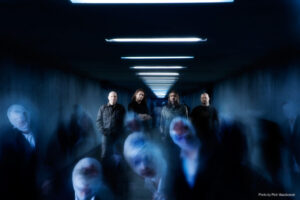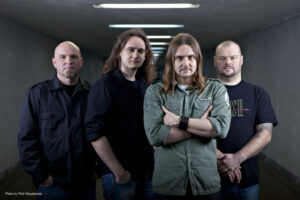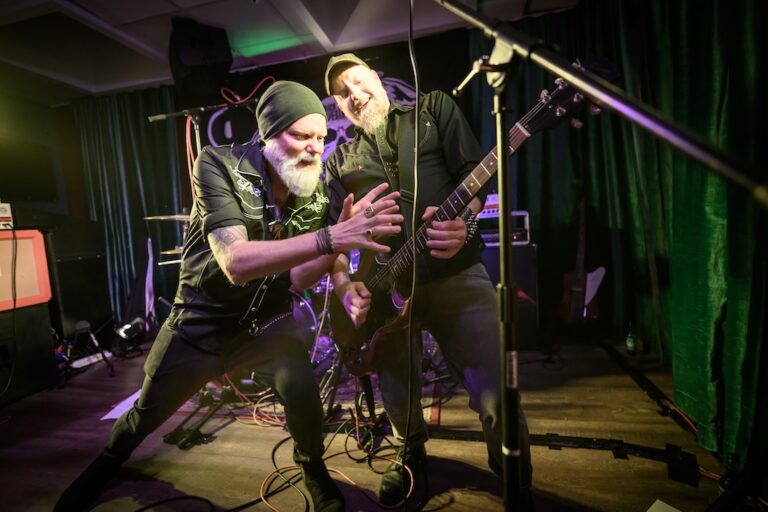Riverside are a band who have been thrilling ever increasing audiences for over a decade now. Hailing from Poland, the various members of the band come from a wide variety of musical backgrounds, the result being that Riverside’s take on the progressive genre is both dramatic and muscular, allowing them to straddle the worlds of classic rock and metal with consummate ease. Last album ADHD was a remarkable effort that flowed beautifully whilst simultaneously capturing the spirit of stress and anxiety that has encapsulated the modern age – a musical dichotomy last cogently expressed by Pink Floyd on the Dark Side of the moon, an album which similarly mixed weighty themes of mental anguish with some of the most beautiful music laid down on record. A stunning, and critically acclaimed effort, it is, therefore, no surprise that the band’s latest effort (and the ensuing tour which sees them hitting UK shores in March) is hotly anticipated.
With the new album, ‘shrine of new generation slaves’, out this week, we felt it the perfect opportunity to speak with the charmingly open frontman of Riverside, Mariusz Duda, the mastermind also behind Lunatic Soul, to see if we could gain a greater insight into the workings of Poland’s most popular progressive act.
After twelve years of playing as Riverside how do you feel you have developed musically as a band?
You said twelve? Oh my god! Well – it’s sad because I feel the same as I did twelve years ago… well, maybe not exactly the same because I know I have recorded some stuff that’s very interesting [laughs] for some people… but I think what I’m most proud of is that I did something with Riverside which is kind of recognisable, if I can say that. What I mean is that I tried to do some kind of music style that is… when you listen to it you can hear that it is that particular band. And that is very hard to do when you’ve got a million other bands, these days especially – you’ve got access through all those portals on the internet and everything- so I guess what I’m very happy about is that I did something like Riverside – something that people can recognise and that was the biggest challenge from the beginning and I’m very happy that I achieved that in some way and that’s the best for me.
When did you first become aware that Riverside was gaining a large international following?
Well the first thing was our demo which we recorded in March 2003 and we did our first show and we added this as a free bonus with the tickets. After that – that was a show for 300 people – there were a lot of interesting discussions on forums and everywhere and we became kind of popular in Poland only because of that one show and that one demo. So – wow! Something happened in that kind of music here in Poland and so that’s why later we released our first album because we really wanted to do something with this. But the first impression was when we signed our first contract with Inside Out and we released our second album, ‘Second life syndrome’, so the reactions were fantastic and we were very surprised by that. We played a lot of shows abroad and that was something like the beginning of our band in 2005… so it’s still not twelve years! It’s more like seven or eight [laughs]!
The members of Riverside came from varied backgrounds including death metal – do you feel that the idea of progressive music – of searching for new ways of expressing yourself through music – is what draws together people from such diverse backgrounds?
Well – that’s kind of interesting you know because I was the only one who had some kind of experience with this progressive music and our drummer and our first keyboard player, didn’t have – they were from a totally different fairy-tale and because my previous band was that kind of music and I… there was a lot of crap in that previous project, I have to admit, some kind of neo-progressive… boring progressive rock. That kind of progressive rock that, when you listen to this, you feel you very bored… you can feel it’s boring. And I wanted to avoid that, and the fact that I was working with guys that didn’t have experience that way was kind of original and kind of cool. Especially when the drummer would play totally differently… sometimes too much [laughs]I but when we combined all those elements I felt it was kind of attractive because all those death metal backgrounds connected with songs like ‘in two minds’, for instance, from our first album, it was a very interesting combination and maybe that’s why in some circles we were kind of popular.
There seems to be a very strong progressive scene in Poland…
Yeah that’s true… I don’t know why! Maybe it’s because of Frederick Chopin! I don’t know! Yeah – but people like that kind of music here in Poland but there’s still many more bands playing that kind of music than there are audience members coming to see them! So there are a lot of young bands, a lot of potential and I think it’s still growing up. So far, fortunately, we are the most popular band in Poland in terms of people coming to see us but I think it will change soon because there are a lot of young bands who simply need to survive so they record one album and then, a year later, another one and later another one to do something with their position because there are a lot of bands that just burn up after one CD and that’s it. So far I’ve noticed that Polish progressive rock is much more famous abroad than it is on the local market which is a very strange paradox.
Very early on I believe you sang in Polish but then you moved to English – it must be difficult to express the same emotions in a second language?
Yeah, that’s true but unfortunately you can just hear this, you know, there are lyrics and there are lyrics and I noticed that that’s a problem with bands – they’re just singing in English and playing, let’s say progressive rock, but it’s mostly about… I don’t know… I don’t want to offend anyone, but some kind of landscapes, you know, the sun, nature and birds… and I know this is hard to express because I think mostly people don’t think in another language – they just think in their language and then later there’s some kind of translation – I try to avoid it as much as I can, I try to think in another language. Everything’s changed now because the younger generation speaks English much better than the… older generation, let’s say, but they just come very natural now and it’s like the universal language that you need to know and you can just study it easily but it’s also some kind of barrier for many bands, that’s true.
Have you ever considered recording two versions of an album – English and Polish – like Hunter have?
Oh no, not at all, I don’t think my language would fit to the music because… it depends: I’m not writing poems, I’m writing songs and I think that my lyrics and the language I am using fits to the music much better than if I did it in the Polish way. I think that Polish language is much better for alternative music than for progressive things. I never wanted to do this – put something on the Polish market and then later do something again… no this is not honest – I can’t sing in Polish by the way! I tried, but it sounds horrible – I can hide my mistakes much better in English, this is another thing….
The last album dealt with the themes of “life in a constant hurry, stress and anxiety about the future” – is this something that is still preoccupying you now?
I would say that these albums are connected to each other lyrically, yes. There was much more psychology now than there was on the first three albums. Yeah – I’m doing some kind of observation and some kind of pictures of these days but the main difference is that ADHD was more from the outside and now it’s more introverted – from the inside of… I don’t know… the human soul? But this is kind of connected – I really wanted to say something about the times that I live in and paint some pictures of my last two years of life and I felt that these days a lot of people feel very, very frustrated – I don’t know why. It was last year when I started to write the lyrics – maybe it’s because of the economic crisis; maybe it’s because of the end of the world – I don’t know; but for me it was really aggressive – these people were starting to behave in a way that they seem simply unable to take control of their own life and behave like slaves in a big factory or big corporation, or whatever and that’s why I wanted to write again about these days – it’s sort of personal with many people that I know. I’m the lucky guy who’s just doing something slowly and connected with my passion but for many people that sounds very strange – how is it possible to do something for a living and like it? – I just wanted to write about some different kind of situations that are connected to when you feel like a slave.
One of the things I’ve always loved about progressive music is how albums often flow very intricately from one track to the next – how long do you spend sequencing Riverside albums?
I have to admit I’m a huge fan of listening to the album from the beginning to the end – and also I’ve recorded stories – doing my own radio stories – for my education and with a strange voice! And I remember that it was huge fun for me and probably it stayed because now when I play an album I just want to sit on the couch and let it play from the beginning to the end so I really have to remember about the beginning, about some kind of turning points and I have to remember about the end – the grand finale or whatever – so yeah, I totally try to pay attention to that.
Another feature of progressive music is the visual representation – for example once you see a Pink Floyd or Marillion cover it’s not easily forgotten : How much time do you spend working on finding the right artist and the right visual approach for your music?
We were lucky because we met Travis Smith on the first album and we’re still working together with Travis and this time he did an amazing job and created one of his best pieces of art I think. I’m so very happy for this, because today was the day when I released the CDs and the vinyl for the new one and I have to say, OK, vinyl – is amazing – but also now I’m keeping my hands on the CD and, well, all those people who say that CD format should have died… they should see this package and say it to me again, out loud! [laughs] You know – I’m older generation, I like to touch stuff in a way you just can’t with MP3 files – I’m not against them but I like to have something on the shelf because I’m a collector and this is maybe why progressive music is lucky: because a lot of collectors and people pay attention to how it looks. In fact I know of situations where people buy records only because of the cover! Riverside always wanted to have this visual side and, you know, maybe not on stage because I’m not a huge fan of connecting music with the visuals in this theatrical way – because it takes away the possibility of doing some kind of improvisation or something; but with the releases we pay great attention to the visuals and I think the new one is something that you really need to touch, so that’s the score I think.
You mentioned live performance and you’re off on a European tour very soon, including a visit to England in March…
Yes we’re coning and we’re going to play four shows, which is something very special to us because normally when we come to England we play London, and this time we get to play three shows more in other places which is great. Yeah – we’re starting at the beginning of March and we are going to play shows over the whole year and so far we have shows in March and April, shows in Poland in May and for the first time we’ll do a tour in the United States and one show in Mexico, which is great, and other shows as well.
What can your fans expect from the Riverside show?
I think we’ll be playing a lot of material from the new one, but we’d also like to play old tracks – maybe with different arrangements and variations because I’m not a huge fan of playing exactly the same versions as on the album and I think it’s a different production this time because there are moments, on the new album, where I play on the bass guitar and, actually, on three or four different bass guitars and that will be a kind of challenge for live so we’ll need to change arrangements and some way of playing and I think that will be interesting.
Do you prefer the visceral thrill of being on stage or do you prefer the more meticulous act of creating music in the studio?
If I’d been asked that question last year I would have said the studio because I was playing a lot of shows but now that I’ve spent one year in the studio, I’d say that I much prefer playing shows. It depends on the situation – I do love to play shows when I have the power, when I feel good and I’m not sick; when the crowd are good and so on. However I also love to spend time in the studio. I have my solo project, Lunatic Soul, also, which is mainly based in the studio now and so – I think because of this someone could think that I prefer the studio much more than playing live shows. I enjoy both sides however.
Any final words for your UK fans?
Firstly I’d like to say hello! And thank you all for the support. I don’t know why, but I think with this album we’ll start a new chapter in our history and career, and I’m very happy that step by step we’re reaching new borders. We’d like to invite everyone for our tour and we hope to see you at the shows.





